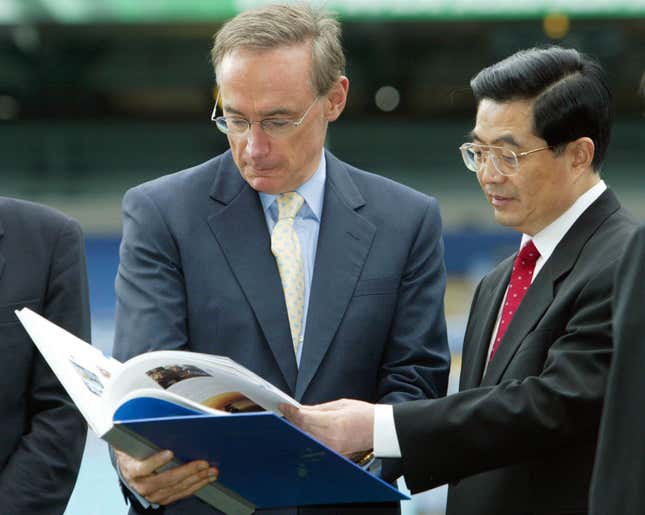
This item has been corrected.
Australia wants to be less dependent on China, but appears unsure what to do next.
In a speech in New York yesterday, foreign minister Bob Carr claimed Australia is not all about coal and iron ore, adding that only 2% of the labor force works in mining jobs. Another report quoted Carr saying Australia should sell more of what he vaguely called “ideas” to the rest of the Asia Pacific.
Yet because China is slowing down, and with that its demand for Australian metals and coal, the effects are bigger than Carr makes out. Not only are Ozzie miners cutting pay and jobs, the resources sector’s previously substantial contribution to the nation’s tax base is falling. Prime Minister Julia Gillard is under pressure to balance the budget, facing a shortfall in resource related royalty revenues.
The Australian government appears short on ideas. According to this columnist (paywall), the nation is focusing on “short term survival through cost control”.
This is quite a turnaround for a country that has for several years enjoyed a major resources boom. A few months ago in Western Australia, the state that is home to the bulk of the mining industry, three-bedroom bungalows in a small town were selling for US$1 million.
According to government figures, mining makes up less than a tenth of Australia’s GDP.
But the digging industry means more than that to Australian businesses, particularly retailers. Before the likes of BHP Billiton began paring back wages, wealthy miners became some of the nation’s biggest spenders (paywall). The country’s media refers to them as ”cashed-up bogans”, slang for working-class folk with money. They like sports cars, enormous televisions, and in some cases (gasp) the theater. A book was published about their enthusiastic consumerism in November 2010.
A survey published in May (PDF, page 4) found Australian miners were earning 58% more than their white-collar counterparts at banks and insurers. The average wage for financial services workers was A$1375 (US$1,433) a week last November, while miners took home A$2,173 a week. The authors at Suncorp Bank said these “flouro collared workers,” a colloquial reference to miners’ flourescent overalls, were “out-earning all other industries by an average of A$500 a week.”
The miners’ largesse has fanned out to other sectors of the economy. The Australian minimum wage is now A$15.51 an hour. Including hotel accomodation, an average night out in Perth, the capital of Western Australia, costs more than A$400.
Yet boom times in the place its inhabitants call the “lucky country” are reversing. Independent Chinese economist Andy Xie believes (video) Australia will be “the next Spain.” Xie says Australia has high debt and has seen a property boom caused by an influx of foreign money. The commodities turndown will cause foreign investment to leave the country, and the housing market could crash, dragging Australia’s banks down with it, Xie argues.
Xie is often bearish and may not be right. But Australia’s economy looks sickly. Housebuilding is slackening, retail sales are falling, and this has coincided with stalling growth in China. Whatever its government says about not being overly dependent on mining or China, Australia’s future prospects do not look bright. In Perth and Sydney, expect prices of very large televisions and new sports cars to fall.
Correction (Sept. 25): An earlier version of this article incorrectly gave Julia Gillard’s title as Premier; this has been corrected to Prime Minister.